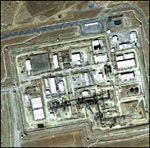 AFP: Iran agreed on Monday to ship the bulk of its low enriched uranium abroad in a fuel swap deal backed by Turkey and Brazil that could blunt calls for sanctions over Tehran’s sensitive nuclear programme.
AFP: Iran agreed on Monday to ship the bulk of its low enriched uranium abroad in a fuel swap deal backed by Turkey and Brazil that could blunt calls for sanctions over Tehran’s sensitive nuclear programme.
By Farhad Pouladi
 TEHRAN (AFP) — Iran agreed on Monday to ship the bulk of its low enriched uranium abroad in a fuel swap deal backed by Turkey and Brazil that could blunt calls for sanctions over Tehran’s sensitive nuclear programme.
TEHRAN (AFP) — Iran agreed on Monday to ship the bulk of its low enriched uranium abroad in a fuel swap deal backed by Turkey and Brazil that could blunt calls for sanctions over Tehran’s sensitive nuclear programme.
The agreement, which commits Iran to depositing 1,200 kilograms (2,640 pounds) of its low enriched uranium in Turkey in return for nuclear fuel for its Tehran reactor, was signed in the Iranian capital by the foreign ministers of Iran, Turkey and Brazil.
Iran said that with the signing of the deal, the ball is now in the court of Western powers while President Mahmoud Ahmadinejad called for fresh talks over the Islamic republic’s nuclear programme.
“I hope the 5+1 (UN Security Council permanent members plus Germany) enter talks with honesty, respect and fairness and heed the great work started in Tehran,” the official IRNA news agency quoted Ahmadinejad as saying.
But Israel quickly accused Tehran of trickery while Western diplomats close to the UN atomic watchdog said that by agreeing to ship some uranium to Turkey, Iran has not removed the case for further UN nuclear sanctions.
French Foreign Minister Bernard Kouchner said in Paris the International Atomic Energy Agency (IAEA) must be the first body to respond to Iran’s agreement while the German government said nothing could replace a deal between Iran and the UN’s nuclear watchdog.
Iran is already under three sets of UN sanctions for refusing to halt its uranium enrichment, which the West fears hides a covert nuclear weapons programme. Tehran insists it will go ahead with enrichment, even after signing the fuel deal.
Monday’s signing came after three-way talks in Tehran by Iranian President Mahmoud Ahmadinejad, Brazilian President Luiz Inacio Lula da Silva and Turkish Prime Minister Recep Tayyip Erdogan.
The deal appeared to mark a breakthrough in long-stalled discussions over the refuelling of the Tehran research reactor that makes radioisotopes for cancer treatment.
The IAEA has been trying to persuade Iran since October to sign a deal with the United States, France and Russia that would see Iran’s stockpile of low enriched uranium shipped out of the country and then turned into fuel for the research reactor.
But Iran has so far stalled on the deal, insisting it wants to keep the uranium on its own soil for a simultaneous swap with reactor fuel.
Uranium enrichment is at the centre of western suspicions over Tehran’s atomic programme, because in a highly purified form, it can be used to make the fissile material of a nuclear bomb.
Under the new agreement, a copy of which was obtained by AFP, Tehran is ready to deposit 1,200kg (2,640 pounds) of low enriched uranium “within one month.”
In return, the United States, France and Russia would deliver 120kg of fuel required for the reactor “in no later than one year.”
Suspicions remained Monday however over Tehran’s true intentions.
“The Iranians have manipulated Turkey and Brazil,” a senior Israeli official in Jerusalem told AFP on condition of anonymity.
“The Iranians have already pulled off such a trick in the past — by pretending to accept such a procedure to lower tensions and reduce the risk of harsher international sanctions, then refusing to follow through,” he said.
The Israeli official conceded however that the fuel swap arrangement would “radically complicate” efforts by world powers looking to rein in Iran’s nuclear programme by means of sanctions.
“It is going to be much more difficult for the United States or the Europeans to reject this arrangement because we won’t be only dealing with Iran, which is much easier to handle, but with rising powers, such as Brazil and Turkey, with whom relations are very sensitive,” he said.
The office of EU foreign affairs chief Catherine Ashton in Brussels said the deal “does not answer all of the concerns” raised by Tehran’s nuclear programme.
Western diplomats close to the IAEA pointed out that Western concerns were more to do with Tehran’s nuclear enrichment programme rather than its efforts to secure fuel for the Tehran research reactor.
Turkish Foreign Minister Ahmed Davutoglu said there was “no need” for further UN sanctions against Iran in the light of the deal.
“This agreement should be regarded positively and there is no need for sanctions now that we (Turkey and Brazil) have made guarantees and the low enriched uranium will remain in Turkey,” he said.
Both Russia and the United States had made it clear they considered Lula’s visit to Iran as Tehran’s last chance to stave off a new round of sanctions against Iran over its nuclear enrichment activities.


